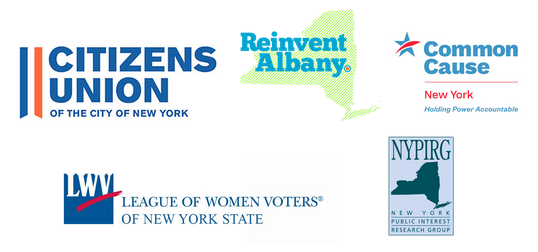Government Watchdogs Urge State Leaders To Repeal Police Secrecy Law 50-a
June 4, 2020
Re: Repeal Civil Rights Law Section 50-a (S3695/A2513)
Dear Governor Cuomo, Speaker Heastie, Senate Majority Leader Stewart-Cousins, Assembly Minority Leader Barclay, and Senate Minority Leader Flanagan,
We strongly urge you to repeal Section 50-a of the Civil Rights Law by passing S3695/A2513. Our groups advocate for accountable government and strong transparency laws. We believe 50-a is a loophole in the state’s Freedom of Information Law that reduces the accountability of perhaps the most powerful part of local government – the police. We note that the state’s own Committee on Open Government has officially called for repealing 50-a since at least 2014.
The preamble to New York’s Freedom of Information Law says, “A free society is maintained when government is responsive and responsible to the public, and when the public is aware of governmental actions. The legislature therefore declares that government is the public’s business.”
Section 50-a is completely contrary to the intent of the Freedom of Information Law. 50-a deprives the public of information necessary to ensure their police department – a government agency – properly supervises, trains and oversees police officers. 50-a hinders independent oversight of the police by local legislatures and civilian review boards and helps hide problem officers from public scrutiny.
New York’s Freedom of Information Law includes specific provisions, and extensive case law, that protects the personal privacy of government workers, including police officers. For instance, FOIL does not permit disclosing the home addresses of police officers. Additionally, the state Committee on Open Government has issued two advisory opinions that say police disciplinary records are exempt from disclosure under FOIL when allegations or charges of misconduct have not yet been determined or did not result in disciplinary action, or when allegations of misconduct were not substantiated.
That is not to say that FOIL would never require disclosure of documents relating to unsubstantiated reports of misconduct or that such disclosure would always be inappropriate. For example, in a high-profile case in which the nature of the complaint and the name of the police officer were already a matter of public knowledge, and where there was controversy surrounding the adequacy of the investigation, the appropriate balance between the public interest in the matter and the privacy interest of the police officer might tip in favor of disclosure. It is precisely that kind of careful weighing of factors that FOIL mandates and Section 50-a precludes.
If there is near-complete secrecy surrounding officer misconduct and discipline – as 50-a currently imposes – then New Yorkers will have no confidence in our police oversight apparatus. Every police officer is impugned when the public cannot tell whether officers are held accountable and face consequences for misconduct. This poses a serious risk to both civilians and police officers.
The effect of Section 50-a is to significantly deprive the public of information necessary to ensure the accountability of police officers for misconduct. It also limits police departments’ ability to ensure accountability through their systems of civilian complaints and disciplinary proceedings. Without information as to the outcome of such proceedings in substantiated cases, it is impossible to know if those systems are functioning properly.
That is why it is so urgent to repeal Section 50-a of the Civil Rights Law. Having access to police disciplinary records, knowing when allegations of misconduct have been substantiated, and knowing the outcomes of disciplinary proceedings will allow us to identify individual and systemic problems in the police and bolster the dignity and professionalism of the department.
New York is one of only two states that grant police officers special privacy protections beyond what other public employees have. California repealed its own special privacy protections in 2018. In 2020, it’s unacceptable that New York pass a watered-down reform bill. The provision should be repealed fully by passing S3695/A2513.
As reform groups, we know how vitally important it is that all functions of government be transparent and accountable, but given the nature of the work police officers do every day, this is especially critical for law enforcement. Right now, we see the impact of the public’s frustrations with police unaccountability in the streets of New York City and throughout the country and, indeed, the world. Section 50-a is an obstacle to public transparency and should be repealed immediately.
Sincerely,
Betsy Gotbaum
Executive Director
Citizens Union
John Kaehny
Executive Director
Reinvent Albany
Susan Lerner
Executive Director
Common Cause NY
Laura Ladd Bierman
Executive Director
League of Women Voters of NY State
Blair Horner
Executive Director
NYPIRG
CC:
New York State Senate
New York State Assembly

